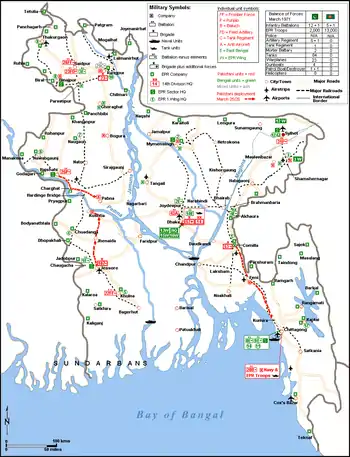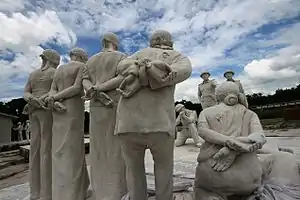Bengali Genocide Remembrance Day
Bengali Genocide Remembrance Day (Bengali: বাঙ্গালি গণহত্যা স্মরণ দিবস Bāṅgāli Gaṇahatyā Smaraṇ Dibas/ Bangali Gonohotta Shoron Dibosh) or Bangladesh Genocide Memorial Day is a national day observed on 25 March in Bangladesh to commemorate the victims of the Bengali genocide of 1971, approved unanimously in 2017.[2][3][4]
| Genocide Remembrance Day গণহত্যা স্মরণ দিবস | |
|---|---|
 National Martyrs’ Memorial | |
| Observed by | Bangladesh Bangladeshi diaspora |
| Type | National |
| Significance | Commemoration of the Bengali Genocide |
| Date | 25 March |
| Frequency | annual |
| First time | 2017[1][2] |
History
The date 25 March commemorates Operation Searchlight, a planned military pacification carried out by the Pakistan Army, started on 25 March to curb the Bengali independence movement by taking control of the major cities on 26 March, and then eliminating all opposition, political or military,[5] within one month. Before the beginning of the operation, all foreign journalists were systematically deported from East Pakistan.[6][7]
On 11 March 2017, the Parliament of Bangladesh unanimously passed Resolution designating 25 March as a Genocide Remembrance Day.[8][9] The day honours and remembers those who suffered and died as a consequence of killings by the Pakistani Army in 25 March 1971, which started with Operation Searchlight and ended with the 1971 Bangladesh Genocide and the Independence of Bangladesh.[10][11][12][13] During this period the persecution of Bangla population by Pakistan army led by General A.K. Niazi was notable. It is believed this was on account of the contempt the dominant Punjabi Pakistanis had for of Bengalis, there was mounting evidence that among the Bengalis, the Hindu minority was doubly marked out for persecution. In a post war enquiry several senior Pakistani officers admitted to systematic targeting of the community on the orders from a brigadier which General Niazi had denied.[14]
"Bangladesh will reach out to UN seeking recognition of 1971 genocide while the government declared March 25 as genocide day", according to Liberation War Affairs Minister AKM Mozammel Huq.[15]
Gallery
 Location of Bengali and Pakistani military units during Operation Searchlight
Location of Bengali and Pakistani military units during Operation Searchlight The Jallad Khana memorial at one of the killing fields in Mirpur
The Jallad Khana memorial at one of the killing fields in Mirpur.jpg.webp) Human remains and war materiel in Liberation War Museum
Human remains and war materiel in Liberation War Museum A sculpture in Meherpur showing the execution of Bengali intellectuals by the Pakistan Army
A sculpture in Meherpur showing the execution of Bengali intellectuals by the Pakistan Army Monument in honour of those killed at Dhaka University
Monument in honour of those killed at Dhaka University
See also
References
- "Whole nation should observe National Genocide Day". New Age. 14 March 2017. Retrieved 6 July 2017.
- "Bangladesh declares March 25 as Genocide Day". NTV. 11 March 2017. Retrieved 6 July 2017.
- "PM slams Pakistan for propaganda about '71 genocide". The Daily Star. 20 February 2017. Retrieved 6 July 2017.
- "Declare March 25 as Genocide Day". The Daily Sun. 17 February 2017. Retrieved 6 July 2017.
- Salik, Siddiq, Witness To Surrender, pp 63, 228–9 ISBN 984-05-1373-7
- Siddiqui, Asif (December 1997). "From Deterrence and Coercive Diplomacy to War: The 1971 Crisis in South Asia". Journal of International and Area Studies. 4 (1): 73–92. JSTOR 43106996.
- "JS may be moved to mark March 25 as Genocide Day". The Daily Sun. Retrieved 22 March 2017.
- "Parliament passes motion to mark March 25 as Genocide Day". The Daily Star. 11 March 2017. Retrieved 22 March 2017.
- "Parliament declares March 25 Genocide Day". Dhaka Tribune. 11 March 2017. Retrieved 22 March 2017.
- "Jatiya Sangsad declares March 25 as "Gonohotya Dibosh" | Weekly Bangla Mirror". www.banglamirrornews.com. Archived from the original on 15 March 2017. Retrieved 22 March 2017.
- "Parliament declares March 25 as "Gonohotya Dibosh"". Archived from the original on 15 March 2017. Retrieved 22 March 2017.
- "14-party alliance to observe March 25 as 'Genocide Day'". Nirapad News. Archived from the original on 17 March 2017. Retrieved 22 March 2017.
- "JS resolution on Day of Genocide hailed". Bangladesh Sangbad Sangstha. Archived from the original on 15 March 2017. Retrieved 22 March 2017.
- Bass, Gary J. (2014). The Blood Telegram: India's Secret War in East Pakistan. Penguin Random House India Private Limited. ISBN 9789353051853.
- "News Details". www.bssnews.net. Archived from the original on 23 March 2017. Retrieved 24 March 2017.